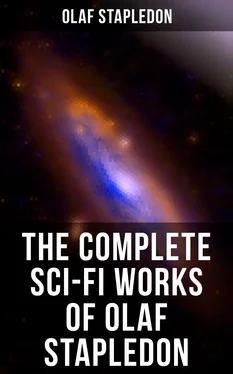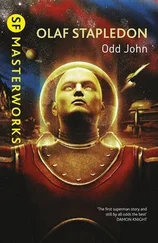It was after a lengthy period of peace and scientific advancement that the Eighth Men made a startling astronomical discovery. Ever since the First Men had learned that in the life of every star there comes a critical moment when the great orb collapses, shrinking to a minute, dense grain with feeble radiation, man had periodically suspected that the sun was about to undergo this change, and become a typical ‘White Dwarf’. The Eighth Men detected sure signs of the catastrophe, and predicted its date. Twenty thousand years they gave themselves before the change should begin. In another fifty thousand years, they guessed, Venus would probably be frozen and uninhabitable. The only hope was to migrate to Mercury during the great change, when that planet was already ceasing to be intolerably hot. It was necessary then to give Mercury an atmosphere, and to breed a new species which should be capable of adapting itself finally to a world of extreme cold.
This desperate operation was already on foot when a new astronomical discovery rendered it futile. Astronomers detected, some distance from the solar system, a volume of non-luminous gas. Calculation showed that this object and the sun were approaching one another at a tangent, and that they would collide. Further calculation revealed the probable results of this event. The sun would flare up and expand prodigiously. Life would be quite impossible on any of the planets save, just possibly, Uranus, and more probably Neptune. The three planets beyond Neptune would escape roasting, but were unsuitable for other reasons. The two outermost would remain glacial, and, moreover, lay beyond the range of the imperfect ether-ships of the Eighth Men. The innermost was practically a bald globe of iron, devoid not merely of atmosphere and water, but also of the normal covering of rock. Neptune alone might be able to support life; but how could even Neptune be populated? Not only was its atmosphere very unsuitable, and its gravitational pull such as to make man’s body an intolerable burden, but also up to the time of the collision it would remain excessively cold. Not till after the collision could it support any kind of life known to man.
How these difficulties were overcome I have no time to tell, though the story of man’s attack upon his final home is well worthy of recording. Nor can I tell in detail of the conflict of policy which now occurred. Some, realizing that the Eighth Men themselves could never live on Neptune, advocated an orgy of pleasure-living till the end. But at length the race excelled itself in an almost unanimous resolve to devote its remaining centuries to the production of a human being capable of carrying the torch of mentality into a new world.
Ether-vessels were able to reach that remote world and set up chemical changes for the improvement of the atmosphere. It was also possible, by means of the lately rediscovered process of automatic annihilation of matter, to produce a constant supply of energy for the warming of an area where life might hope to survive until the sun should be rejuvenated.
When at last the time for migration was approaching, a specially designed vegetation was shipped to Neptune and established in the warm area to fit it for man’s use. Animals, it was decided, would be unnecessary. Subsequently a specially designed human species, the Ninth Men, was transported to man’s new home. The giant Eighth Men could not themselves inhabit Neptune. The trouble was not merely that they could scarcely support their own weight, let alone walk, but that the atmospheric pressure on Neptune was unendurable. For the great planet bore a gaseous envelope thousands of miles deep. The solid globe was scarcely more than the yolk of a huge egg. The mass of the air itself combined with the mass of the solid to produce a gravitational pressure greater than that upon the Venerian ocean floor. The Eighth Men, therefore, dared not emerge from their ether-ships to tread the surface of the planet save for brief spells in steel diving suits. For them there was nothing else to do but to return to the archipelagos of Venus, and make the best of life until the end. They were not spared for long. A few centuries after the settlement of Neptune had been completed by transferring thither all the most precious material relics of humanity, the great planet itself narrowly missed collision with the dark stranger from space. Uranus and Jupiter were at the time well out of its track. Not so Saturn, which, a few years after Neptune’s escape, was engulfed with all its rings and satellites. The sudden incandescence which resulted from this minor collision was but a prelude. The huge foreigner rushed on. Like a finger poked into a spider’s web, it tangled up the planetary orbits. Having devoured its way through the asteroids, it missed Mars, caught Earth and Venus in its blazing hair, and leapt at the sun. Henceforth the centre of the solar system was a star nearly as wide as the old orbit of Mercury and the system was transformed.
Table of Contents
Table of Contents
I have told man’s story up to a point about half-way from his origin to his annihilation. Behind lies the vast span which includes the whole Terrestrial and Venerian ages, with all their slow fluctuations of darkness and enlightenment. Ahead lies the Neptunian age, equally long, equally tragic perhaps, but more diverse, and in its last phase incomparably more brilliant. It would not be profitable to recount the history of man on Neptune on the scale of the preceding chronicle. Very much of it would be incomprehensible to terrestrials, and much of it repeats again and again, in the many Neptunian modes, themes that we have already observed in the Terrestrial or the Venerian movements of the human symphony. To appreciate fully the range and subtlety of the great living epic, we ought, no doubt, to dwell on its every movement with the same faithful care. But this is impossible to any human mind. We can but attend to significant phrases, here and there, and hope to capture some fragmentary hint of its vast intricate form. And for the readers of this book, who are themselves tremors in the opening bars of the music, it is best that I should dwell chiefly on things near to them, even at the cost of ignoring much that is in fact greater.
Before continuing our long flight let us look around us. Hitherto we have passed over time’s fields at a fairly low altitude, making many detailed observations. Now we shall travel at a greater height and with speed of a new order. We must therefore orientate ourselves within the wider horizon that opens around us; we must consider things from the astronomical rather than the human point of view. I said that we were half-way from man’s beginning to his end. Looking back to that remote beginning we see that the span of time which includes the whole career of the First Men from Pithecanthropus to the Patagonian disaster is an unanalysable point. Even the preceding and much longer period between the first mammal and the first man, some twenty-five millions of terrestrial years, seems now inconsiderable. The whole of it, together with the age of the First Men, may be said to lie half-way between the formation of the planets, two thousand million years earlier, and their final destruction, two thousand million years later. Taking a still wider view, we see that this aeon of four thousand million years is itself no more than a moment in comparison with the sun’s age. And before the birth of the suns the stuff of this galaxy had already endured for aeons as a nebula. Yet even these aeons look brief in relation to the passage of time before the myriad great nebulae themselves, the future galaxies, condensed out of the all-pervading mist in the beginning. Thus the whole duration of humanity, with its many sequent species and its incessant downpour of generations, is but a flash in the lifetime of the cosmos.
Читать дальше












